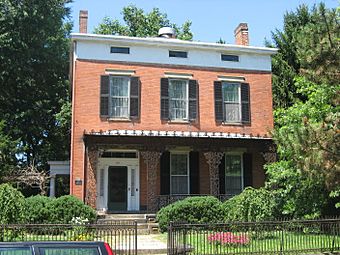Vanmeter Church Street House facts for kids
Quick facts for kids |
|
|
Vanmeter Church Street House
|
|

Front of the house
|
|
| Location | 178 Church St., Chillicothe, Ohio |
|---|---|
| Area | Less than 1 acre (0.40 ha) |
| Built | 1848 |
| Architectural style | Greek Revival |
| NRHP reference No. | 79001935 |
| Added to NRHP | February 21, 1979 |
The Vanmeter Church Street House is a special old house found on Church Street in Chillicothe, Ohio, United States. It was built in 1848. This house shows off the Greek Revival style, which was popular back then. A farmer named William H. Thompson built it.
Just eight years after it was finished, a politician named John I. Vanmeter bought the house. He was a member of the Whig Party. John Vanmeter was from Virginia but had lived in Ross County for 30 years. He was an important person in Ohio's government. He served in the Ohio House of Representatives and the Ohio Senate in the 1830s. Later, he was even a member of the United States House of Representatives from 1843 to 1845.
Contents
Exploring the Vanmeter Church Street House
The Vanmeter House is a two-and-a-half story building made of brick. It is located in a neighborhood with many other well-preserved houses from the 1800s. The bricks are laid in a pattern called a stretcher bond. The roof is made of metal. Experts consider this house one of the best examples of Greek Revival style in the area.
What is Greek Revival Architecture?
Greek Revival architecture was a popular building style in the United States during the early to mid-1800s. It was inspired by the ancient temples of Greece. Buildings in this style often have grand columns, triangular gables (the part of the wall that encloses the end of a pitched roof), and simple, strong shapes. They often look like ancient Greek temples. This style showed a connection to the ideas of democracy and classic beauty.
Key Features of Greek Revival
- Columns: Often tall and stately, supporting the roof or a porch.
- Symmetry: Buildings are usually balanced, with equal parts on both sides.
- Simple Shapes: Clean lines and strong, rectangular forms.
- Low-Pitched Roofs: Often hidden behind a front facade.
- White or Light Colors: Many buildings were painted white to look like marble.
The Vanmeter Family's Legacy
When John I. Vanmeter passed away, he left his house to younger members of his family. This means the house stayed in the Vanmeter family for a long time. In the late 1970s, the house was still owned by his descendants. This shows how important the house was to the family's history.
A Historic Landmark: National Register of Historic Places
In 1979, the Vanmeter Church Street House became a very important landmark. It was officially listed on the National Register of Historic Places. This list includes buildings, sites, and objects that are important in American history, architecture, archaeology, engineering, and culture.
Why Was It Listed?
The house was added to the National Register for two main reasons:
- Its Place in Local History: The house is important because of its connection to John I. Vanmeter, a notable politician from the area.
- Its Architecture: The house is a great example of well-preserved Greek Revival architecture. It shows how buildings were designed and built in the 1800s.
Being on the National Register helps protect historic places. It encourages people to preserve them for future generations to learn from and enjoy.
Images for kids




